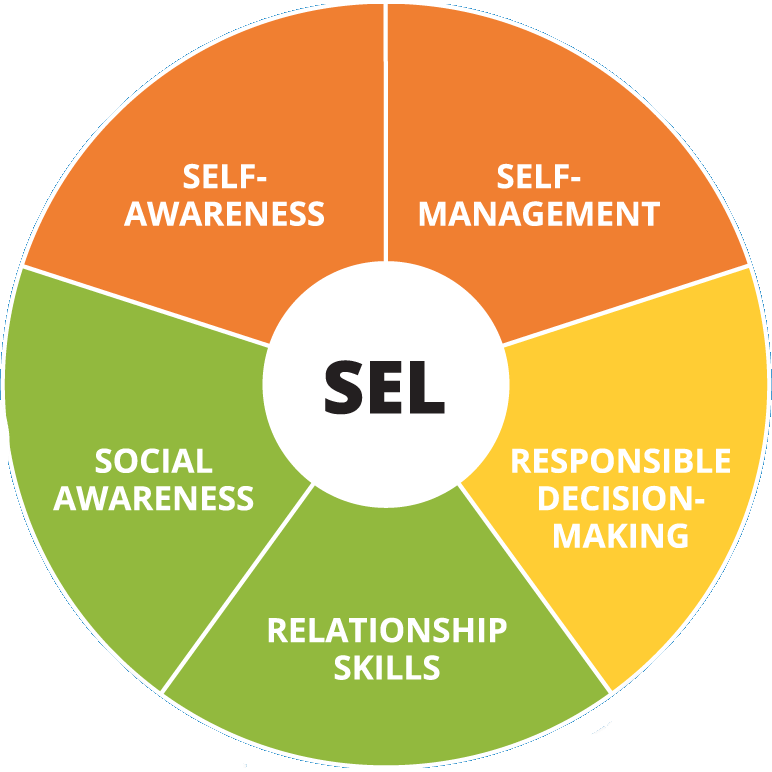K2 Indicators
ALL
S |
|---|
SEL-K2.RS.4tw
K2.RS Relationship Skills Indicator
TW Teamwork
SEL-K2.RS.4tw Demonstrate appropriate strategies for receiving feedback from others for self-improvement and to promote group effectiveness.Student Learning Targets:Knowledge Targets
Reasoning Targets
Skills (Performance) Targets
Product Targets
Proficiency ScaleThe Student is able to...(1) Beginning
(2) Developing
(3) Proficient
(4) Advanced
| |
SEL-K2.RS.5cr
K2.RS Relationship Skills Indicator
CR Conflict Resolution
SEL-K2.RS.5cr Identify conflict in various situations.Student Learning Targets:Knowledge Targets
Reasoning Targets
Skills (Performance) Targets
Product Targets
Proficiency ScaleThe Student is able to...(1) Beginning
(2) Developing
(3) Proficient
(4) Advanced
| |
SEL-K2.SeA
| |
SEL-K2.SeA.1ie
K2.SeA Self-Awareness Indicator
IE Identifying Emotions
SEL-K2.S-A.1ie Recognize and accurately label emotions, and identify situations that cause those emotions.Student Learning Targets:Knowledge Targets
Reasoning Targets
Skills (Performance) Targets
Product Targets
Proficiency ScaleThe Student is able to...(1) Beginning
(2) Developing
(3) Proficient
(4) Advanced
| |
SEL-K2.SeA.2rs
K2.SeA Self-Awareness Indicator
RS Recognizing Strengths
SEL-K2.S-A.2rs Differentiate between likes and dislikes.Student Learning Targets:Knowledge Targets
Reasoning Targets
Skills (Performance) Targets
Product Targets
Proficiency ScaleThe Student is able to...(1) Beginning
(2) Developing
(3) Proficient
(4) Advanced
| |
SEL-K2.SeA.3sce
K2.SeA Self-Awareness Indicator
SCE Self-Confidence & Efficacy
SEL-K2.S-A.3sce Accept failure and demonstrate the ability to recover from perceived failures.Student Learning Targets:Knowledge Targets
Reasoning Targets
Skills (Performance) Targets
Product Targets
Proficiency ScaleThe Student is able to...(1) Beginning
(2) Developing
(3) Proficient
(4) Advanced
| |
SEL-K2.SeA.4asp
K2.SeA Self-Awareness Indicator
ASP Accurate Self-Preception
SEL-K2.S-A.4asp Identify and seek help when appropriate.Student Learning Targets:Knowledge Targets
Reasoning Targets
Skills (Performance) Targets
Product Targets
Proficiency ScaleThe Student is able to...(1) Beginning
(2) Developing
(3) Proficient
(4) Advanced
| |
SEL-K2.SeM
| |
SEL-K2.SeM.1ic
K2.SeM Self-Management Indicator
IC Impluse Control
SEL-K2.S-M.1ic Demonstrate self-control in a variety of settings.(e.g.. differentiate between needs and wants, follows school-wide behavior expectations) Student Learning Targets:Knowledge Targets
Reasoning Targets
Skills (Performance) Targets
Product Targets
Proficiency ScaleThe Student is able to...(1) Beginning
(2) Developing
(3) Proficient
(4) Advanced
| |

